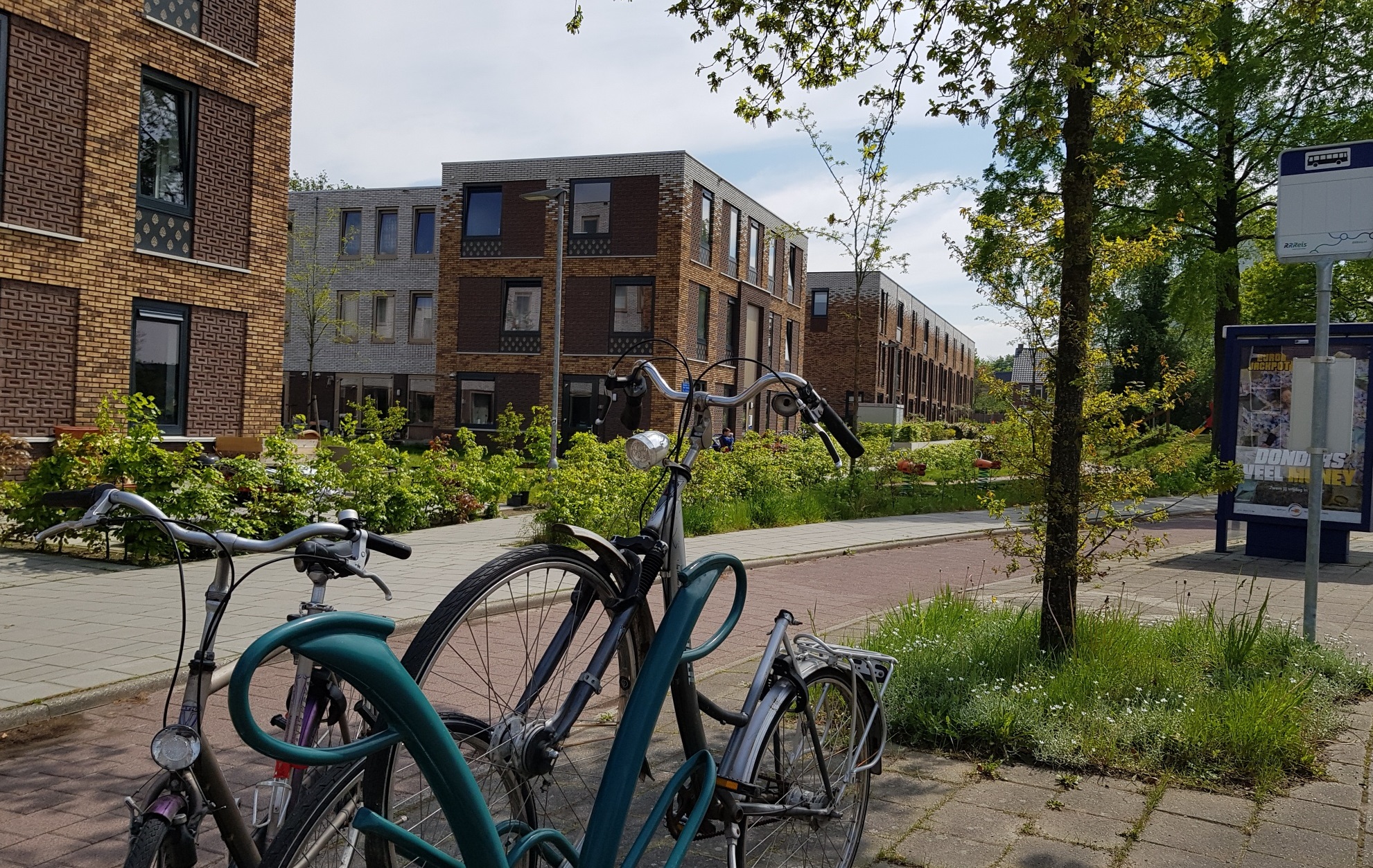Every summer we wonder how many new students will arrive in Wageningen needing a room. This year, circumstances make it even harder to predict. ‘We’ve got to think about emergency scenarios.’
Stay away if you don’t have a room yet. This was the appeal put out in July by VU University Amsterdam and the University of Amsterdam, among others. It is ‘hard to predict’ how many new students will come to Wageningen, says Ingrid Hijman, head of the Student Service Centre. ‘For example, 160 students from China have applied, but it remains to be seen how many will actually come: it only takes a new Covid-related development for all flights to be cancelled. The war in Ukraine could have an impact too: what effect does a conflict like that have on the world and how does that affect our figures?’ There are some question marks closer to home too, says Hijman. ‘How many of the Dutch applicants will decide at the last minute to take a gap year and only start in 2023, when they will get student grants again?’
Guarantee
These uncertainties make it difficult to make a good prognosis regarding how many of the registered students will actually start a degree here. This prognosis is important, because it is the basis on which WUR reserves rooms for new international students with Idealis and draws up new construction and renovation plans. Whereas other universities have made strong appeals to stay away, WUR seeks to arrange a room for every new international student, a room guarantee of sorts. Hijman: ‘Not really a guarantee, but Idealis makes sure there are always 850 vacant rooms for new international students in September. The rooms are rented out for two years, after which the tenants have to move out. That way we always have 800 rooms available immediately, and 50 more in reserve for urgent cases. If more international students arrive, as will probably be the case this year, we normally try to reserve extra rooms with Idealis. At the moment, however, there are very few vacant rooms, so we cannot reserve many extra rooms. It’s going to be touch and go.’
Emergency scenarios
To ensure that hundreds of homeless international students do not come streaming into Wageningen, Hijman has called for preparations to be made for an emergency scenario. ‘That could be a cruise boat in the Rhine used as temporary housing for students during peak periods. After the peak, they can move on to regular rooms.’
It has a major impact on your city and public order if 300 more people suddenly arrive
Hijman sees the municipality as having a key role in such an emergency plan. ‘When making forecasts for student housing, they have always focused on the average student numbers throughout the year rather than the demand at the peak time. And the municipality points to Amsterdam, where the university urges international students not to come to Amsterdam if they don’t have a room. Whereas the situation there is completely different. WUR teaches courses about world problems such as food security and climate change. If you do that, you must give students from all around the world the opportunity to study here. That is completely different to offering psychology in English at a university in order to make money. Anyway, we need an emergency plan and we will now be working on that together.’
WUR teaches courses about world problems such as food security and climate change. If you do that, you must give students from all around the world the opportunity to study here. That is completely different to offering psychology in English at a university in order to make money.’
For a cruise boat the municipality has to draw up emergency regulations
Idealis agrees that it is the municipality’s task to help think through about emergency scenarios. Director Bart van As: ‘It has a major impact on your city and public order if 300 more people suddenly head for Wageningen. We guarantee 800 rooms, but due to a historically low number of vacant rooms, we can’t do much more than that at the moment’. A cruise boat strikes him as a good option, but the current emergency plan is that students may have to share a room temporarily. ‘But for that the municipality has to draw up emergency regulations and they only do that if they are out of other options,’ says Van As.
A room for everyone
Besides providing a roof over the heads of all new international students, Idealis also sets itself the goal of housing all Dutch students who are looking for a room by 1 May. They didn’t manage that last year, Van As explains. ‘On that date, there were still 100 students interested in various rooms. We don’t know whether these were all students without a room or whether they including people wanting to move on to better rooms.’ This year again, it remains to be seen whether all students will have a room by 1 May. ‘If all goes well, the new building at Costerweg 65 will be completed before Christmas, which will make 265 more rooms available. If you add the 100 from last May to the expected additional influx, we should be fine by 1 May 2023. But that forecast is based on normal years.’
Despite the current uncertainties, Van As is satisfied with how Wageningen is doing when it comes to student housing. ‘We are the only university town that gives international students the chance to rent a furnished room for two years. In other towns, they get six months or a year, after which the students are responsible for their next room, based on the assumption that by then they have built up a network and can arrange something themselves. But of course, it’s not like that in reality in the current market’. The idea behind the two-year contracts is that you can complete a Master’s programme in that time, Van As says. ‘If that doesn’t work out, that’s not necessarily a problem either. You’ll have to leave your room, but by then you’ve been registered long enough to find a new one in the regular system.’
Dutch students are relatively well off here too, says Van As. ‘No other city guarantees them a room by 1 May. And we didn’t quite manage that last year either, but it is our aim and our building plans are in line with it. And we expect to succeed again this year.’ So the situation in Wageningen should be seen in the right perspective, says Van As. ‘In Amsterdam there is a shortfall of 20,000 rooms, here it’s 100.’
New builds
Nevertheless, it is important that the building plans go ahead, says Van As. ‘The total number of WUR students is still increasing thanks to several consecutive years of a growing intake. It is therefore important that we make headway with the new building projects’. In addition to Costerweg 65, there will be a student residence on Marijkeweg 20 – the old catering school. ‘Not an Idealis building, but it will be student housing,’ Van As says. ‘We are also working on Bornsesteeg 2.0 (400 units) and Born Oost, a project on the Mansholtlaan (250 units).’
Altogether, that should be enough to house all the students in the coming years. But building is a pretty complicated business these days, so nothing is certain. In the meantime, the star-shaped flats that are so typical of Wageningen, the first of which (Asserpark) dates back to 1969, are due for an update. Van As: ‘Firstly, we are going to make them more sustainable and secondly, we want to bring them more in line with what today’s students want. In Dijkgraaf, for example, there are units with 10 and 18 residents. We want to convert them into units with five or six residents and a nice communal area.’ When that is to happen has not yet been decided.
A response from the municipality
In a response to this article, a spokesperson for the municipality wrote: ‘It is the shared ambition of the municipality, Idealis and WUR to ensure that everyone has a room by 1 May. And Idealis will make provision for a peak period of high demand. Each year, WUR, Idealis and the municipality make an estimate of the expected number of students and the fresh supply of student rooms. The picture that emerged from the last prognosis this spring was that the student room market is quite relaxed, and there may even be moments when there are vacant rooms. But there is always a peak in the demand for rooms at the beginning of the academic year, as is currently the case.
Recently, it appeared that there may be a larger influx than expected. So Idealis, WUR and the municipality are now exploring the options so we can cater for the international students.
Because student recruitment is so hard to predict and depends on many factors, since 2021 we consult with WUR and Idealis on how to respond to the peaks and dips in demand for student housing. We will continue to do this together in future and will also look at possible emergency scenarios.’

 There should be an emergency scenario to prevent dozens of homeless international students from turning up in Wageningen, says head of the Student Service Centre Ingrid Hijman. ‘That could be a cruise boat in the Rhine used as temporary housing for students during peak periods.’ Illustration Valerie Geelen
There should be an emergency scenario to prevent dozens of homeless international students from turning up in Wageningen, says head of the Student Service Centre Ingrid Hijman. ‘That could be a cruise boat in the Rhine used as temporary housing for students during peak periods.’ Illustration Valerie Geelen 

